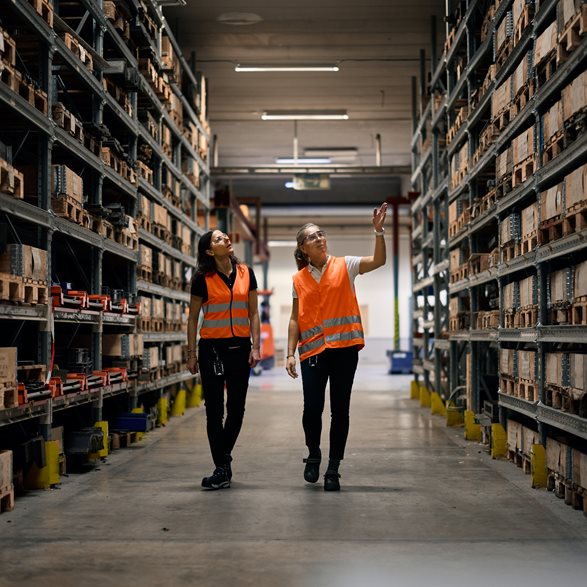2023 Annual report sustainability content

Planet Positive approach
Central to our sustainability efforts is our Planet Positive offering – products and services that are significantly more energy- or water-efficient than an industry benchmark or a previous-generation product in the market.
We target to grow Planet Positive sales faster than overall sales. Our Planet Positive portfolio already includes over 100 products, and we aim to keep expanding and improving this offering to have a Planet Positive product for every part of our customers’ value chain. To achieve this, all our R&D projects must have sustainability benefits; we aim to have 80% of our R&D spend on Planet Positive product and services offering development by 2030.
In 2023, Planet Positive sales were EUR 1.5 billion. 99.8% of R&D project spend was with projects that have sustainability targets and 79% of our R&D spend was towards developing new Planet Positive producs.
Avoiding CO2 emissions in our own operations and logistics
We have ambitious CO2 emissions reduction targets for our own operations. We target net-zero emissions by 2030. In logistics we aim to decrease CO2 emission by 20% by 2025. In addition, we aim for 15% decrease in water consumption per employee in water scarce locations and 90% less waste landfill by 2030.
In 2023, we decreased CO2 emissions in our own operations by 73% compared to 2019 baseline. We achieved this by using a higher proportion of renewable energy sources and increasing the energy efficiency of our processes and facilities. Almost all Finnish locations shifted to renewable energy and the Tampere plant partially switched to green power in 2023. We also made investments into our own energy generation, for example by building solar power systems and by changing heat-treatment energy sources from gas to electric at our foundry in Vadodara, India.
Optimized logistics can significantly reduce our environmental footprint. In 2023, we reduced our logistics CO2 emissions by 7% compared to 2019. However, reducing logistics CO2 emissions is proving to be difficult given increasing business volumes, so we are looking for innovative ways to optimize the logistics even further, for instance by batching several shipments into one to optimize container loads.


Health and safety performance
We have an uncompromising approach to health and safety for all our employees, partners, customers and other stakeholders, and a comprehensive agenda to continuously improve our safety performance. In 2022, our LTIFR was 1.2 and TRIFR 3.0.
In 2023 we continued the work on the fatality prevention program that was launched in 2022. The purpose of the program is to prevent fatalities and severe injuries through a standardized approach to control the highest safety risks. As a result of the program, in 2022 we produced ten safety directives that set out detailed health and safety requirements for our businesses. These directives are the basis of our ten Life-Saving Rules.
In 2023, we performed audits at 11 locations. In response to the audit findings and risk observations, over 350 corrective actions were implemented to improve the overall level of safety.
Our supplier engagement
We encourage our suppliers to commit to the Science Based Targets initiative (SBTi). One of our sustainability targets is that 30% of procurement spend is with suppliers who have committed to SBTi by 2025. Our supplier engagement program started in 2020 and 25.6% of our suppliers were committed to SBTi by the end of 2023.
Our annual auditing program identifies suppliers to be audited based on a supplier sustainability risk assessment. In 2023, we conducted 172 supplier sustainability audits, while 59% of the corrective actions
identified had been implemented by year-end.

Our progress against sustainability targets
{{decodeHtmlEntities(field.label)}} |
|---|
